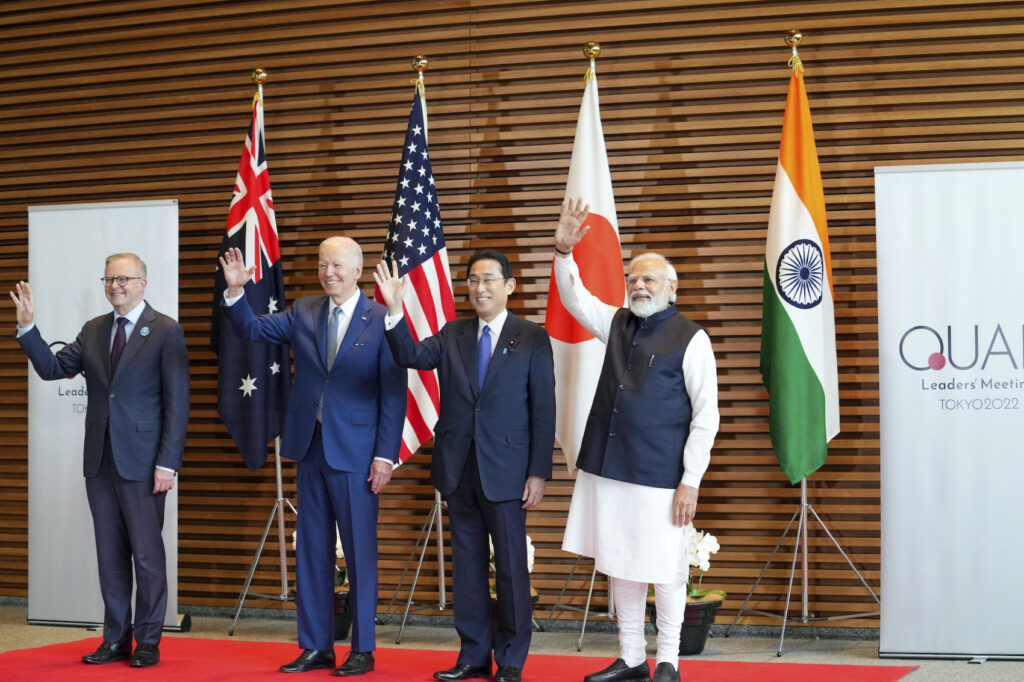Tokyo, 24 May, /AJMEDIA/
Japan, the United States, Australia and India will agree during their leaders’ meeting on Tuesday in Tokyo to launch a maritime initiative in the Indo-Pacific that will help countries track illegal fishing, a U.S. government official said, a move reflecting their concerns over China’s assertiveness in neighboring waters.
The Quad leaders gathered for their second in-person meeting to reaffirm their commitment to a “free and open Indo-Pacific,” with Russia’s war in Ukraine reinforcing the need to prevent a similar situation from occurring in the region.
Japanese Prime Minister Fumio Kishida was joined by U.S. President Joe Biden, Indian Prime Minister Narendra Modi and Australian Prime Minister Anthony Albanese, who will make his diplomatic debut following his Labor Party’s general election win on Saturday.
The group of four major Indo-Pacific democracies is widely seen as a counterweight to China’s growing clout in the region, and has been promoting what it calls “practical cooperation” in areas such as coronavirus vaccines, infrastructure, climate change and critical technologies.
Under the envisioned maritime initiative, the Quad members will cooperate to help deliver “maritime domain awareness” capability across the region, such as through data-sharing, according to the official.
There is demand in countries in the Pacific and elsewhere to improve their ability to “know what is happening in countries’ territorial waters and in their exclusive economic zones,” he said.
The Quad summit is being hosted for the first time by Japan — a country increasingly challenged by China’s territorial claims in the East China Sea, North Korea’s nuclear and missile threats and a long-running territorial dispute with Russia.
While affirming their progress on a range of issues, the Quad leaders are likely to highlight respect for the sovereignty and territorial integrity of all nations — among them Ukraine — in a joint statement after the meeting.
But the document may avoid any explicit accusations against Russia, in apparent consideration of India’s historically close ties with Moscow. New Delhi has stood out among the Quad members by not condemning Moscow over the war in Ukraine and also refraining from imposing sanctions.
China is believed to be closely watching developments in Russia’s invasion of Ukraine and the response to the war from the United States and its allies to build its strategy toward Taiwan — a self-ruled democratic island which Beijing views as a renegade province to be reunified with the mainland, by force if necessary.
China, meanwhile, has been militarizing outposts in disputed areas of the South China Sea and carrying out repeated incursions into Japanese waters around the Senkaku Islands, a group of East China Sea islets controlled by Tokyo but claimed by Beijing.
As mentioned in previous statements issued by the Quad leaders, the envisioned joint document is expected to touch on the members’ resolve to meet the challenges to the maritime rules-based order in the East and South China seas, sources familiar with the matter have said.
The Quad engagement has moved to the leaders’ level under the Biden administration as it seeks to rally U.S. allies and like-minded countries to counter China. The leaders held their first in-person meeting in September in Washington.
The Biden administration has emphasized the Quad as one of the “new configurations” designed to take on the challenges of the 21st century, along with the Indo-Pacific security partnership formed last year between Australia, Britain and the United States, dubbed AUKUS.
While the Ukraine crisis has led to an awareness that Russia is an “acute threat,” Biden administration officials have said China is a “long-term pacing challenge” that should be prioritized.
Biden traveled for the Quad summit as part of his first trip to Asia since taking office in January last year. He will return to Washington Tuesday evening.

